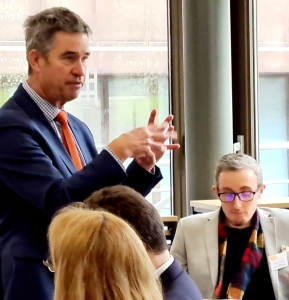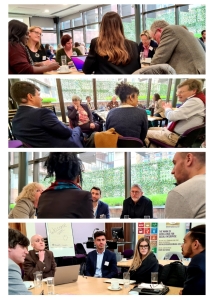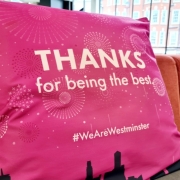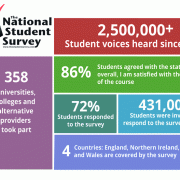The Golden Thread: Embedding social enterprise for better student outcomes
All professional worlds have their own jargon. The term ‘being student-centred’ is an important one for universities, but can be a challenge to achieve for an institution that has so many competing priorities. The increasing politicisation of the university world has also led to challenges around what exactly this term means.
On 25th April 2022, we held our first face-to-face networking meeting as part of a collaboration conference, for two years at the University of Westminster, one of our Social Enterprise Gold Mark holders. It was a really exciting and energetic event. The summary report can be found on our website.
 Being more student-centred around social enterprise was a key topic flagged up at the event. Dr Peter Bonfield, Vice Chancellor at University of Westminster said that 1 in 5 of their students go on to set up their own businesses, with many looking to make a difference to society and create a better world. Generational trends show that Generation Z are much more socially and environmentally conscious with many dedicated to fighting social and environmental change.
Being more student-centred around social enterprise was a key topic flagged up at the event. Dr Peter Bonfield, Vice Chancellor at University of Westminster said that 1 in 5 of their students go on to set up their own businesses, with many looking to make a difference to society and create a better world. Generational trends show that Generation Z are much more socially and environmentally conscious with many dedicated to fighting social and environmental change.
Mission and values are therefore of increased importance to students in gaining a higher education. They also want to see evidence of how these are being delivered at all levels of the institution. This is why the social enterprise business model is so crucial. It provides the framework for a business that is creating social and environmental value as its raison d’etre. It links directly into, for example, the delivery the UN’s Sustainable Development Goals (SDGs) and civic responsibilities.
It is not a by-product; it is a state of mind and culture – the Golden Thread.
Findings from our conference show that there is a need to make better connections between the different threads from the student’s point of view, both inside and outside the teaching environment. For instance, extra-curricular activity needs better academic credit as well as making the better links to local social enterprises by bringing the ‘outside in’ through knowledge exchange (KE) activities.
Finance is another area that needs greater connection and thought. Many universities are still not embedding social value with equal emphasis to financial value into their finance modules themselves. This leaves a disjointed approach whereby social value often sits separately in a different function within the institution.
 Achieving the right advice and type of funding and support is also a challenge with much start-up funding and support focusing on a narrow base of STEM and high growth companies. Pitching competitions can also act as a barrier as many more socially motivated and marginalised students to not feel confident in this style. We need more links to peer-to-peer lending and support programmes outside the university setting as well as pivoting internal university support (including pump priming and growth capital) to help social enterprises grow sustainably.
Achieving the right advice and type of funding and support is also a challenge with much start-up funding and support focusing on a narrow base of STEM and high growth companies. Pitching competitions can also act as a barrier as many more socially motivated and marginalised students to not feel confident in this style. We need more links to peer-to-peer lending and support programmes outside the university setting as well as pivoting internal university support (including pump priming and growth capital) to help social enterprises grow sustainably.
When a university shows leadership in this area, we see jigsaw pieces come together for students too. There are good examples of how universities, such as Westminster (that hold our Gold Mark) have done this as set out in my joint article with Diana Beech for HEPI.
By making more distinctive links between student’s needs, teaching, the community, research and values, we see the best outcomes for a supportive environment and greater sustainability for all in the longer term.
Managing Director, Social Enterprise Mark CIC







Leave a Reply
Want to join the discussion?Feel free to contribute!